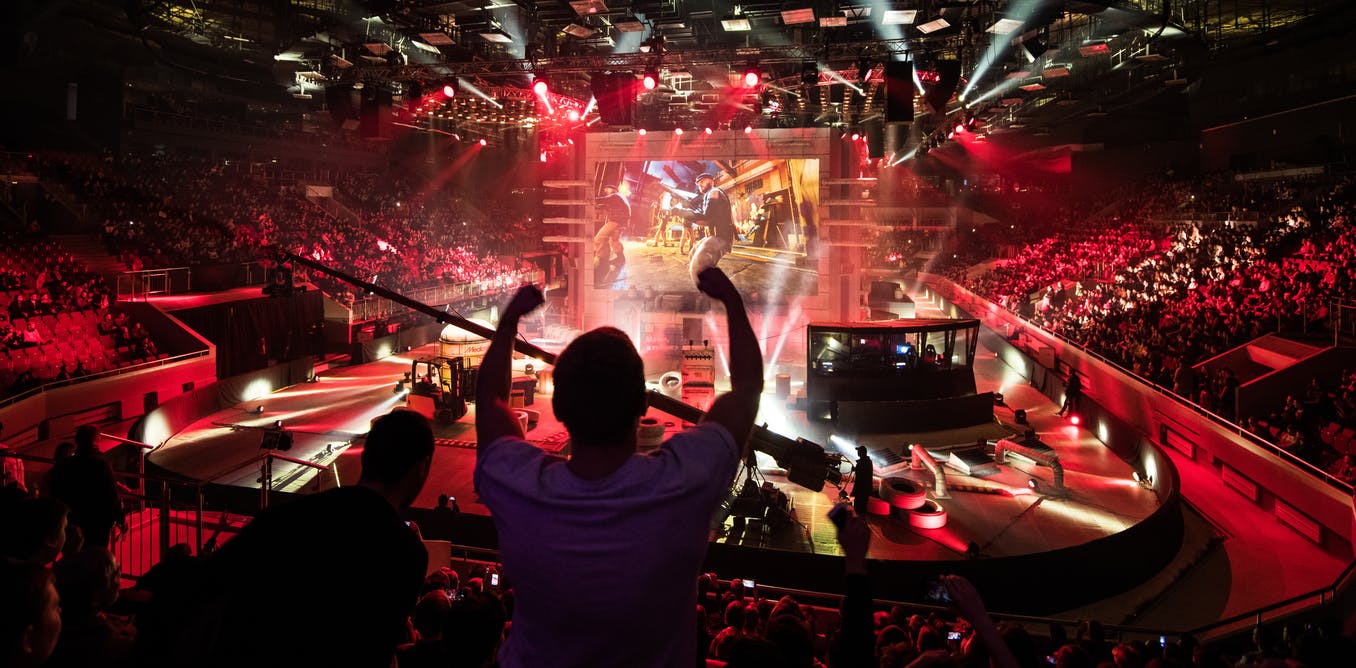Esports is the future of all sports – here’s why

The Counter Strike Global Offensive cyber sport event in St Petersburg, Russia, in October, 2017. Shutterstock/RomanKosolapov
The future of all sports is esports. That may sound like a bold statement but there is growing evidence to support it. Today’s spectators and participants expect to be digitally engaged while they watch. And the most effective way to deliver digital engagement is through “gamification” – the transformation of watching into playing.
While the “real” sports world is still far bigger than the competitive esports community, esports is showing supporters a new kind of future. A future where experiences make the most of fans’ desire for interactivity within their leisure experiences. Today’s consumer does not just want to watch or listen, they also want to participate – and esports integrates these principles into people’s leisure time.
À lire aussi :
Will Super Mario ever be an Olympic sport?
The latest transformation that is bringing these two worlds even closer together is the creation of new, virtual reality gaming experiences, which are turning esports into physically active experiences. Virtual reality may just be the technology that unites the two worlds of sports and esports which are, otherwise, struggling to find common ground.
While it may take some years to fully realise the impact of esports, the rise of mobile and virtual reality gaming combine to make a tantalising prospect on which to imagine its future. Consider HADO, a new, two versus two, sports arena-based game consisting of virtual reality battles.
Players each wear VR headsets and strap mobile devices to their arms, through which they can see each others’ actions and fling virtual fireballs at each other – a sort of digital version of dodgeball. One of the reasons that HADO is so important is that it brings a three-dimensional experience to an esports arena, where otherwise they are played out on flat screens for spectators to watch. Sony is even working on a spectator VR system to watch esports in virtual reality.
The rise of affordable virtual reality headsets, are also kick-starting a new fitness revolution, with pimped-up gymnasia fast becoming virtual reality exercise spaces. This convergence of high-end gaming technology with physical fitness may be the most compelling way to bring these two worlds together.
The VR Olympics?
Rumours are that the International Olympic Committee is interested in virtual reality as a possible route for esports inclusion within the Olympic programme. But rather than just being virtual versions of today’s sports, new kinds of sports such as HADO are likely to emerge. Alternatively, the stadia and fields of play of conventional sports may be re-imagined in virtual arenas, designed to maximise excitement. For example, tomorrow’s tennis stars could be playing on VR courts where they are able to move in three dimensions, rather than two. This could be made possible with three dimensional, full-body virtual reality systems where you can feel and truly experience the world around you by wearing a exo-suit to simulate the virtual environment.
In less than one year, the Tokyo 2020 Olympic Games will take place, amid widespread speculation that esports will find a place on – or at least near – the podium. For example, recently in Tokyo an esports hotel has just been launched and is expected to be ready for Games time. As well, Olympic partner Intel recently announced an Olympic-sanctioned esports tournament taking place days before the Games open.
And while esports won’t be a medal sport in Tokyo next year, 2019 is the first year in which a major sports event has included esports medals. In this respect, the South-East Asian Games is pioneering the association with esports and further indicating that this emerging technology is gradually finding its way into sports mega-events.
À lire aussi :
Fortnite World Cup and the rise of the esports industry
Meanwhile, talks continue to take place in relation to the programme for the Paris 2024 Olympic Games, which is likely to follow its two predecessors and have some kind of esports event. And in 2019, the European Games included esports within its cultural programme, rather than the sports programme.
It is worth remembering that, in the early decades of the modern Olympic Games, medals were given for cultural achievements. The original vision was to celebrate sport blended with culture and education, values still enshrined in the Olympic Charter.
So, before we conclude the conversation about the relationship between esports and traditional sports, we should remember that today’s esports may be analogised to the silent film era from 100 years ago. There’s a great deal of technological evolution still to come and esports are still in the process of being established.

Andy Miah is an Academic Adviser to the International Esports Federation




